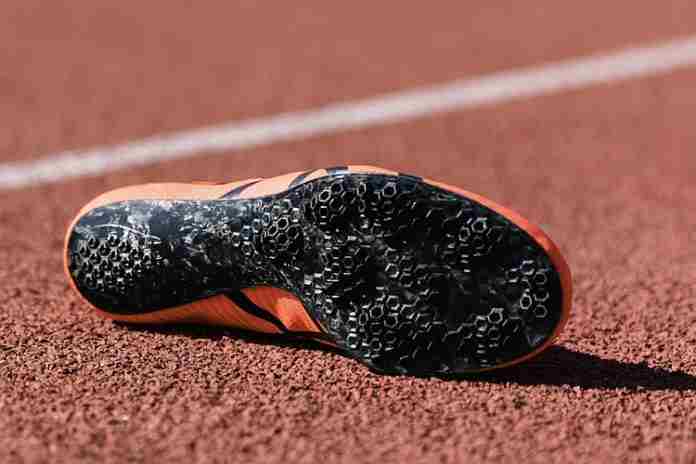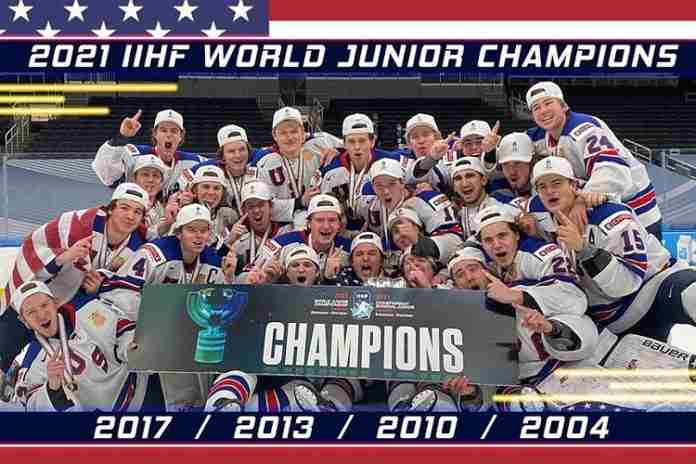(★ Friends: Thank you for the 34 donations received toward our bill for server and support costs; now at 81% of our goal. If you would like to join in, please donate here. Your enthusiasm is the motivation for this site. ★)
We’re less than a week into 2021 and it’s already been a tumultuous year on ice, with the U.S. men upsetting Canada, 2-0, to win the IIHF men’s World Junior (U-20) Championship in Edmonton last night, and IIHF President Rene Fasel (SUI) conceded that the federation is looking at possible alternatives to Belarus as a co-host for the 2021 men’s World Championship in view of the continuing political unrest there.
Our preview of the year ahead has covered the expected stars of a Tokyo Games, including American stars Simone Biles, Caeleb Dressel and Katie Ledecky, so let’s look ahead to our projected top-5 stories of 2021:
No. 5: The economy and revenue needs for Paris 2024, Los Angeles 2028 and beyond
Thanks to the emergence of vaccines for the coronavirus, something resembling “normal” life is expected to return in 2021. But the calendar is moving ahead for organizing committees in Paris and Los Angeles for the 2024 and 2028 Olympic Games, and for other events.
The Paris organizers state they have raised about half of their €1.1 billion (~$1.35 billion U.S.) domestic sponsorship target and have about two years remaining to obtain the rest. Time enough, but will the business environment rebound strongly enough in Europe?
When Los Angeles was awarded the Games of the XXXIV Olympiad back in 2017, it seemed very far away. It’s about 7 1/2 years away now and drawing closer by the day. The LA28 sponsorship target is an ambitious $2.5 billion (in a $6.9 billion budget) with one sponsorship announced – Delta Airlines – so far. Look for more agreements to be announced post-Tokyo.
The success of LA28 in the commercial marketplace will have a significant ripple effect, possibly impacting the hosting of the 2030 Olympic Winter Games. The best candidate available is Salt Lake City, Utah – host in 2002 – and ready to go again. But choosing Salt Lake City now would negatively impact LA28’s marketing opportunities, but if the L.A. team scores big on the sponsorship front in 2021, it might agree to have Salt Lake City bid for 2030 instead of the expected 2034 date.
Here in the U.S., two 2022 events will be looking for more commercial support as soon as the Covid crisis recedes at all: the World Games in Birmingham, Alabama and the World Athletics Championships in Eugene, Oregon. It’s not the easiest time to be selling.
No. 4: Doping: the cases just keep on coming
The World Anti-Doping Agency will have its hands full in 2021, just from issues remaining from 2020, as will the Court of Arbitration for Sport! Among these:
● The judgement of the Court of Arbitration for Sport on 17 December that narrowed the WADA sanctions on Russia (specifically the Russian Anti-Doping Agency) has been vigorously denounced in many quarters. WADA can appeal this to the Swiss Federal Tribunal, but the 30-day filing period will close on 16 January. Will it pursue an appeal? It should.
● The impasse over payment of dues by the U.S. to WADA is still in discussions. A filing by the U.S. Office of National Drug Control Policy last June criticized WADA and insisted that the U.S. should have more representation on the Executive Committee. WADA responded angrily in June, submitting a red-lined version of the U.S. ONDCP report rejecting its position and noting that the U.S. did not even submit any candidates for the Executive Committee at the last opportunity to do so.
About $2.71 million is at stake here, in a WADA budget of $43.4 million for 2021. Will the U.S. ONDCP position change with a new administration?
● The Court of Arbitration for Sport will be busy with further appeals of doping cases, including a remand of the Yang Sun case. The Swiss Federal Tribunal did not tinker with the CAS decision of 28 February 2020 of an eight-year ban for China’s triple Olympic swimming gold medalist, but ordered a re-hearing because of possible bias of one of the arbitrators. So the case has to be heard again.
Appeals have also been filed in two high-profile track & field cases from the Athletics Integrity Unit. World Athletics filed an appeal against the AIU’s no-fault finding for Bahraini sprinter Salwa Eid Naser in October, where she could have been suspended for up to four years for “whereabouts” failures.
World 100 m champ Christian Coleman of the U.S. has filed an appeal against an AIU decision that imposed a two-year ban for “whereabouts” failures. The hearing schedule for both cases has yet to be announced.
In addition to all this, WADA, the U.S. Anti-Doping Agency and the rest of the anti-doping world will be watching what impact – if any – the extra-territorial jurisdiction of the Rodchenkov Anti-Doping Act of 2019 will have. WADA continues to be under pressure from the U.S. and others to amplify the “athlete voice” within its governance structure, but this could be quickly overshadowed if the U.S. Department of Justice decides to aggressively pursue doping prosecutions for actions outside of the country’s borders.
No. 3: Pipeline, protests, oversight and finance worries for the USOPC
U.S. Olympic & Paralympic Committee chief executive Sarah Hirshland noted in a recent news conference that the organization will be especially busy now with three Games coming in a four-year period: Tokyo in 2021, Beijing Winter Games in 2022 and Paris in 2024.
But that’s not even half of the challenges the USOPC is facing.
Leaving aside for now the looming financial peril if the Tokyo Games are not held, the USOPC has significant issues all around:
● The “pipeline” that produces many members of the U.S. Olympic Team – collegiate sports programs, especially the NCAA schools – has been endangered by financial stress and the coronavirus pandemic.
Stanford is cutting 11 varsity sports. Clemson and Minnesota drew headlines for cutting track & field, although Minnesota reinstated outdoor track only. USA Gymnastics began working with the Collegiate Gymnastics Association and the U.S. Olympic & Paralympic Committee to find ways to save NCAA men’s programs.
Observed University of Arkansas Sport Management Professor Steve Dittmore: “[W]hile the Olympics needs college athletics, college athletics simply does not need Olympic sport, and the December 7, 2020 announcement from the IOC about inclusion of skateboarding, breaking, and surfing to the 2024 Paris Games should underscore this.”
The USOPC has responded, with the formation of a 34-member USOPC College Sports Sustainability Think Tank, but it will need to work fast.
● The USOPC formed a Council on Racial and Social Justice and has agreed to support its recommendations and “will not sanction Team USA athletes for respectfully demonstrating in support of racial and social justice for all human beings.” But what that means exactly to yet to be determined.
Moreover, the IOC Athletes’ Commission appears to be headed in another direction, as its chair, Olympic swimming champ Kirsty Coventry (ZIM) noted in a Twitter post:
“The IOC Athletes’ Commission (AC) has received the statement from the Team USA Council on Racial and Social Justice which elaborates on racial and social problems in their country. This statement will be taken into consideration among the other feedback it has received and continues to receive from the athletes of the other 205 NOCs. …
“While the consultation is still ongoing, from what we have heard so far through the qualitative process, the majority:
“emphasise the right of free speech which is respected at the Olympic Games, and
“express support for preserving the ceremonies, the [awards] podium and the field of play.
“Many have also recognised the practical question of how to choose between the opinions of hundreds of issues from different angles around the world. From the work we have done so far, we can see that it would be very difficult to make such a judgement without diving the athlete community across all 206 NOCs.” (Emphasis added)
If American athletes are protesting in force in Tokyo, what does the USOPC do, and what will be the reaction not just of the IOC, but of so many others in sport worldwide?
● Just as the Tokyo Games are scheduled to start, the work of the Commission on the State of U.S. Olympics and Paralympics should be wrapping up. Created by the passage of the Empowering Olympic, Paralympic and Amateur Athletes Act of 2020, the 16-member group is tasked with reviewing the organization’s recent reforms, diversity, athlete participation, licensing agreements, goals, finances and performance of the National Governing Bodies, with its report due by the end of July 2021.
So far, only six of the 16 members – half of which have to be current or former athletes – have been nominated. It’s hard to know how the Commission is going to work, but it could ask for many more changes in the way the USOPC operates and spends its money.
● Which brings us to finances. If the Tokyo Games does not happen, the entire U.S. Olympic Movement is in trouble. The USOPC is supported primarily by the U.S. share of American television rights sales and IOC sponsorships. If Tokyo doesn’t happen, there will be a lot of trouble.
All of which adds up to a wild year ahead for Hirshland, USOPC Chair Susanne Lyons and the entire organization.
No. 2: What to do about Russia?
In the aftermath of the Court of Arbitration for Sport decision to trim the WADA-imposed sanctions on the Russian Anti-Doping Agency, the visceral reaction of many athletes and observers was to (1) decry the actual sanctions as little more than a “slap on the wrist” and to (2) continue to distrust Russian athletes as potential dopers.
The first demonstration of the “impact” of the CAS version of the sanctions will come on 14 January, when the Russian Handball Federation team – not “Russia” – will face Belarus in a group-stage match at the men’s World Handball Championships in Egypt. The uniforms can be in Russian colors – white, blue and red – and use the logo of the Russian federation, but without text. That’s a long way from banning Russia from any and all World Championships, as the WADA ban purported to do.
U.S. Anti-Doping Agency head Travis Tygart has called it a “re-branding” as opposed to sanctions.
The International Olympic Committee voiced its concern in its terse comment on the CAS decision:
“The IOC has taken note of the CAS decision. It will now carefully evaluate the award and its consequences for competitions within the Olympic Movement, in particular with regard to the Olympic Games Tokyo 2020 and the Olympic Winter Games Beijing 2022. In this respect, the IOC will consult with the International Federations and the International Paralympic Committee with a view to having a consistent approach in the implementation of the award.”
The vanguard among the federations has been World Athletics, which still has Russia on suspension since 2015, but has indicated it might allow a small number of Russian athletes to compete as neutrals in Tokyo. But that decision is still to come.
Russian Sports Minister Oleg Matytsin has been diplomatic and low-key, simply insisting that “clean Russian athletes” should be able to compete. As noted above, WADA would do well to file an appeal on the CAS decision to the Swiss Federal Tribunal.
No. 1: Will Tokyo happen?
This is the no. 1 question for 2021. The unprecedented decision to move the Games from 2020 to 2021 due to the coronavirus pandemic brought with it controversy and costs.
Japan has done a very creditable job of working against the virus, but the rate of infections has been rising of late. The country did allow limited fan attendance at professional baseball games in the fall of 2020, showing that it’s likely that the Games could be held with at least some fans in attendance.
But no one can predict what will happen in the early months of 2020. Will the vaccine reach enough people to allow more fans to attend? Will athletes be able to train, compete in qualification events and be able to get ready for an Olympic Games?
What is sure is that the International Olympic Committee, the Tokyo organizers and the Japanese government will do everything they can to make the Games happen in some form. The overall budget now sits at ¥1.64 trillion or about $15.8 billion U.S. This is up from the ¥1.35 trillion (or ~$12.6 billion) figure expected for the Games to be held in 2020.
The organizers have pledged tight oversight to avoid the “three Cs” – confined spaces, crowded places and close-contact settings – among athletes and staff at the Games, especially at the Olympic Village. If such a plan can be implemented with confidence, and with requirements for pre-Games testing and reporting before admission to Japan, a Tokyo Games will take place.
But nothing is sure. Look for major go/no go points in late March and early April, with a definitive determination surely due by 14 April, exactly 100 days prior to the Opening Ceremony on 23 July.
This is going to be a year of surprises, wrong turns, strong words and unexpected – yes – joys. Quoting Star Trek engineer Montgomery Scott to whales expert Dr. Gillian Taylor in the 1986 classic, Star Trek IV: The Voyage Home: “Hold on tight, lassie. lt gets bumpy from here.”
Rich Perelman
Editor
You can receive our exclusive TSX Report by e-mail by clicking here. You can also refer a friend by clicking here, and can donate here to keep this site going.
For our 709-event International Sports Calendar for 2021 and beyond, by date and by sport, click here!

























